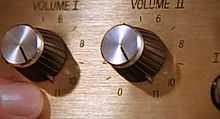Up to eleven

"Up to eleven" or "these go to eleven" is an idiom from popular culture, coined in the movie This Is Spinal Tap, where guitarist Nigel Tufnel proudly demonstrates an amplifier whose volume knob is marked from zero to eleven, instead of the usual zero to ten. The phrase has come to refer to anything being exploited to its utmost abilities, or apparently exceeding them. Similarly, the expression "turning it up to eleven" refers to the act of taking something to an extreme. In 2002 the phrase entered the Shorter Oxford English Dictionary with the definition "up to maximum volume".[1]
Original scene from This Is Spinal Tap
The phrase was coined in a scene from the 1984 mockumentary/rockumentary This Is Spinal Tap by the character Nigel Tufnel, played by Christopher Guest. In this scene Nigel gives the rockumentary's director, Marty DiBergi, played by Rob Reiner, a tour of his stage equipment. While Nigel is showing Marty his Marshall guitar amplifiers, he points out one in particular whose control knobs all have the highest setting of eleven, unlike standard amplifiers, whose volume settings are typically numbered from 0 to 10, believing that this numbering actually increases the highest volume of the amp ("It's one more, ain't it"). When Marty asks why the ten setting is not simply set to be louder, Nigel hesitates before responding blankly, "These go to eleven.", again.[2][3]
Real life
Prior examples
The use of "11" as a maximum predates This Is Spinal Tap by almost forty years. In 1947 the Baldwin Locomotive Works and the Chesapeake and Ohio Railway introduced the Chesapeake and Ohio class M1 steam turbine locomotive. The locomotive's throttle included eleven settings, ranging from one (idling) to eleven (full speed). The locomotive's cruising speed was 70 miles per hour (110 km/h), at which point the throttle was on "seven." During a trial run with a reporter from Popular Mechanics aboard, a C&O engineer expressed his dissatisfaction with a local speed limit of 75 miles per hour (121 km/h), noting that he would "Sure like to be able to pull it back to eleven!"[4]:110; 252
Cultural influence
As a consequence of the film, real bands and musicians started buying equipment whose knobs went up to 11, or even higher, with Eddie Van Halen reputedly being the first to do so.[5] Marshall, the company that provided amplifiers for the film that the custom marked knobs were applied to, now sells amplifiers such as its JCM900 (first sold in 1990) whose knobs are marked from 0 to 20.[5][6] The QSC 3500 and 3800 amplifiers made for the pro sound company Sound Image in the 1990s went to 11, as do Soldano amplifiers. The Fender Champion 600 Limited Edition Reissue, and upgraded retro release of their 1949 classic amplifier, has a "chickenhead" knob that goes up to 12, one better than Tufnel's.
Other controls with a maximum of 11 include SSL mixing consoles, the BBC's iPlayer on demand video player,[7] the headphone volume control on the PreSonus AudioBox 1818VSL, the IRIX audio panel (when invoked with the undocumented -spinaltap option), and the Tesla Model S's volume control.[8] The tachometer on a Singer-modified Porsche 911 goes up to 11, representing 11,000 RPM.[9][10]
On its primary page for the This Is Spinal Tap, IMDb displays the user rating for the film out of 11 stars (e.g. 8.0/11) instead of the standard scale of one to ten.[11][12][13] However, only 10 rating stars are actually shown on the page, and user ratings can only be submitted up to 10 stars. Other IMDb pages display the rating out of 10.
On the Magnetic Fields' album 69 Love Songs, in the song "Time Enough For Rocking When We're Old," the band sings that there will be "time enough for sex and drugs in heaven / When our pheromones are turned up to eleven..."
See also
References
- ↑ Hamilton, Alex (September 26, 2002). "Tardis lands in dictionary of today". Times Online (London). Archived from the original on January 7, 2006. Retrieved June 7, 2014.
- ↑ Memorable Quotes from This Is Spinal Tap IMDB.com
- ↑ "The Script to This is Spinal Tap, v3.". Corky.net. 1995-03-01. Retrieved 2011-09-07.
- ↑ Railton, Arthur R. (March 1948). "Chessie Has That New Look". Popular Mechanics.
- ↑ 5.0 5.1 Karl French (2000-09-22). "The A-Z of Spinal Tap". The Guardian.
- ↑ "Eleven". Spinal Tap A to Zed.
- ↑ Why the BBC’s iPlayer volume control go to 11
- ↑ One Big Step for Tesla, One Giant Leap for E.V.’s
- ↑ "Top Gear drives the mighty Singer 911".
- ↑ Top Gear Series 20 Episode 5
- ↑ This Is Spinal Tap at the Internet Movie Database
- ↑ Trivia: ‘This Is Spinal Tap’ IMDB Rating Goes to Eleven
- ↑ IMDb trivia for This Is Spinal Tap acknowledges special rating
| ||||||||||||||||||||||||||